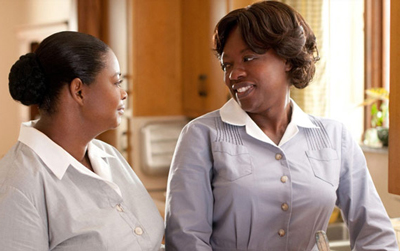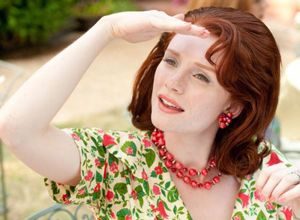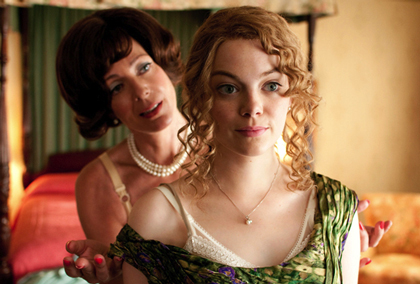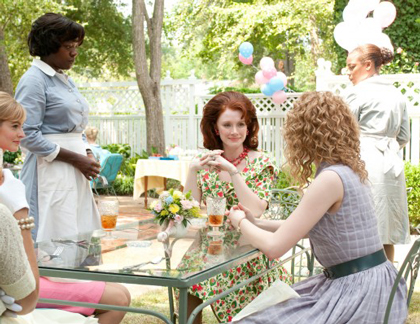
 |
|
|
|
The Liberal Cause movie has long since come of age, but a smart filmmaker can still make the form function well. Tate Taylor and Kathryn Stockett's The Help transcends the norm through its fidelity to its theme and its eye-opening revelation of conditions in the South in the 1960s. The finely crafted film depicts race realities with a clarity rarely seen in the movies. The popular audience traditionally requires an entertaining storyline and a (white) identification figure. The Help has a ready appeal for the vast audience unlikely to look to the movies for a lesson in Civil Rights. In the end, the film generates more then enough social truth and emotional honesty to make it all worthwhile. 
The story takes us to the social swamp of Jackson, Mississippi in 1963. A clique-ish Women's Club rules with an iron fist, enforcing unwritten rules to maintain a bigoted status quo. The young white women were raised in a genteel and 'proper' culture based on racist principles, attitudes and assumptions untouched by the previous century's Great Emancipation. The black women of Jackson labor as underpaid maids, doing all the work for middle-class white women, including raising their children. The babies consider their 'mammys' as their mothers until they reach the age to learn to regard them as 'nigras', a necessary inconvenience. This everyday labor inequity is only one facet of what is actually a terror state: under Jim Crow laws, blacks endure second-class citizen status. The police deal harshly with any black offender denounced by a white, and signs of resistance can attract retribution from the KKK. Eugenia "Skeeter" Phelan (Emma Stone) returns from a Northern college eager to become a journalist, but her former girlfriends expect her to forget about a career, join their petty women's league and find a man to marry. The Alpha female Hilly Holbrook (Bryce Dallas Howard) is the social Queen Bee of this set. Skeeter is repulsed by Hilly's aggressive attitude, which is finding expression in a statute she wants passed that would require households to install 'separate but equal' bathrooms for domestic maids. Cook Minny Jackson (Octavia Spencer) is fired for using Hilly's indoor plumbing, and Hilly spreads the word that she is unemployable. Minny has no choice but to commute outside of town to work for Hilly's sworn enemy Celia Foote (Jessica Chastain of The Tree of Life and The Debt). Celia has been blackballed from all social life in Jackson because she "stole" Hilly's beau. Meanwhile, Skeeter asks friend Liz Leefolt (Ahna O'Reilly) if she can seek housekeeping advice from Aibileen Clark (Viola Davis of Doubt); just the idea of white women conversing on an equal basis with a black maid makes the society women uncomfortable. Skeeter sees another reason to talk to Aibilene: she's become interested in the plight of black maids, because her own beloved maid Constantine (Cicely Tyson), the woman who raised her, has disappeared without word, and Skeeter's own mother Charlotte (Allison Janney) refuses to talk about her. Skeeter wants to write a book about the unjust domestic situation from the point of view of the maids themselves. New York editor Elain Stein (Mary Steenburgen) encourages Skeeter but doesn't realize exactly how risky it is for any maid who cooperates with her: "conspiring to thwart the separation of the races" is an actual law on the Mississippi books. Any maid that talks to Skeeter could find herself unemployable, and even physically threatened. As it is, Hilly's accusation of theft against her new maid has resulted in the poor woman being beaten senseless. 
At first glance The Help looks like a repeat of the old pattern: it's a movie about the problems of black people, but the leading character is a white person concerned about black people. Skeeter Phelan's conspiracy puts her at odds with the law and with a particularly hateful pack of bigoted socialites. Skeeter will be the one to earn a reward of a ticket to a New York job, and the maids will face an uncertain future of employment reprisals. But seeing Hilly Holbrook get what's coming to her makes it all worthwhile. I might wonder if the Hilly character is an exaggeration, but I've seen too many similar social monsters at work, using peer pressure and genteel threats to get their way. I'm sure women run into a lot more of these creatures. Considering all the abuse they must absorb, the powerless black maids might as well be old-fashioned house slaves. Yet they are intimate members of the household, entrusted with caring for their employers' white children. The situation is one of barely-disguised hatred. The socialites of Jackson really aren't that wealthy, and to affect the airs of a privileged class the housewives exploit their maids, cooks and nannies. As Minny says, they aren't paid a minimum wage and they have no Social Security. Liz Leefolt dumps responsibility for her unwanted daughter (the women joke about how fat the child is) on Aibileen. When Hilly lays down the law, Liz must dig into her savings to have a cheap bathroom constructed in her garage. Hilly expects Minny to walk to their garage "colored" toilet through typhoon winds and rain. Poor friendless Celia Foote believes that her ostracization by Hilly is a silly mistake that she can straighten out with a friendly visit. When Celia shows up unannounced on bridge day, the clubwomen drop to the floor to hide from her. Skeeter has to sneak over to Aibileen's house to write down her stories of humiliation and degradation; when she talks to Aibie on the street, white people turn their heads as if something unnatural and suspicious were happening. Whites casually order blacks around in public as if they weren't even people. When a riot breaks out over the shooting of Medgar Evers, Aibileen and Minny must run home in fear and cower with their children. This corner of America is a terror society. When Skeeter watches news accounts of race troubles, her mother orders the TV turned off. 
What with all its scheming and emotional fireworks The Help is in some ways like the old soap opera movie The Women. We concentrate on Hilly and Liz, both of whom appear to be lousy mothers incapable of running a house without professional "help". These women are caught up in the battle lines of the 1960s. Hilly congratulates her women's auxiliary for raising a paltry few dollars for "hunger in Africa" but enjoys torturing a maid who has the gall to ask for a minimal advance on her salary. Skeeter's mother has a terrible secret to confess, about what happened to the beloved maid Constantine. Celia Foote so openly waves her emotions in public that she's bound to be victimized by the deceitful Hilly. It's left to Skeeter, Aibileen and Minny to work up a strategy to neutralize Hilly, or at least drive her into apoplectic fits. Viola Davis and Minny Jackson are the revelatory actors in this show, doing marvelous work with characters that have been seen as simply sassy Mammies or downtrodden victims. The movie is about empowerment, even if that power must be seized with the social equivalent of a palace coup -- or a sneak attack with a chocolate pie. All of the actresses do fine work, and even the film's abrasive characters are given more likeable aspects. Skeeter's mother shows her grit in an audience-pleasing scene. Playing Hilly's occasionally senile mother, Sissy Spacek is given a few zinger 'gotcha' lines. Only Bryce Dallas Howard's Hilly is prevented from striking a human note. She remains a monster to the bitter end, unless we count an anger melt-down worthy of Hot Lips Houlihan. Director Tate Taylor gives The Help a handsome cinematic shape. The film's reality seems to continue outside individual shots. Jackson looks like such an attractive place that all this social degeneracy really doesn't seem to fit. The only aspect of the show that might be a bit lacking is the abortive dating situation between Skeeter and an obnoxious "new young Southerner" who treats her like an idiot. The movie hasn't got enough time to properly play out this relationship, but it seemingly must include it so that viewers won't wonder if Skeeter secretly prefers women. 
This is easily one of the best pictures of the year, and is sure to garner a number of Academy nominations. The problem is, which actress is most deserving, and will cross-nominations cancel out their chances of winning? DreamWorks' Blu-ray + DVD combo of The Help is the expected glorious encoding of this surprise hit of the summer. It's a handsome presentation all around; watching it at home in Blu-ray is just as rewarding as seeing the show in a theater, minus a few uproarious audience reactions. A second DVD disc is included in this particular package. Director Taylor introduces a set of deleted scenes, none of which is missed. A making-of featurette starts right with the story of how the novel came to be. A second featurette lets the director and Octavia Spencer listen to the personal stories of a number of Southern Maids, as they gather in an old church. A music video of Mary J. Bilge's The Living Proof wraps up DreamWorks' quality presentation.
On a scale of Excellent, Good, Fair, and Poor,
The Help Blu-ray rates:
Reviews on the Savant main site have additional credits information and are often updated and annotated with reader input and graphics. Also, don't forget the 2011 Savant Wish List. T'was Ever Thus.
Review Staff | About DVD Talk | Newsletter Subscribe | Join DVD Talk Forum |
| ||||||||||||||||||